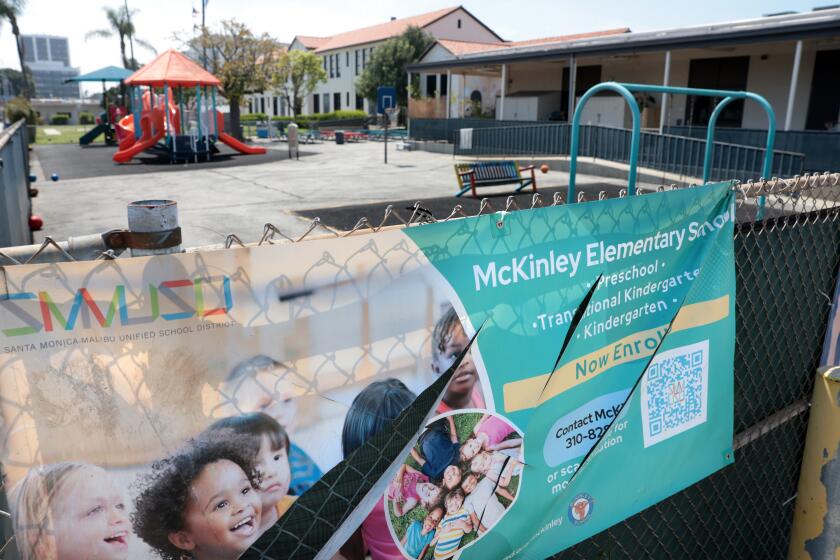Drop in Minorities at UC to Be Studied
Alarmed by declining numbers of African American students at UCLA and other campuses, University of California regents on Wednesday decided to study the effect of the state’s 10-year-old ban on affirmative action on UC admissions and student enrollment.
The inquiry, officials emphasized, will not focus on ways to overturn or subvert Proposition 209, the 1996 voter approved-measure that forbids consideration of race and gender in admissions and hiring decisions at the state’s public colleges and other institutions.
But by examining the initiative’s effects, UC may be able to figure out legal ways to recruit and admit more black and Latino students, the officials said.
“As we plan for the future, we must know if we are doing everything we can, within the legal parameters, to advance the excellence and diversity of the university,” said student regent Maria Ledesma, a UCLA graduate student in education who, along with regent Frederick Ruiz, proposed the study.
The regents’ debate over the issue was relatively mild, given the passions that Proposition 209 has often raised within that body and elsewhere. Regent John J. Moores, who in the past has accused UC of discriminating against Asian Americans in admissions decisions, repeated that claim and urged that any study be done by a group outside the university. “Anything that UC produces internally will not be well-received by some in California,” he said.
Underlining his point that UC must follow the letter and the spirit of the affirmative action ban, Moores asked a university attorney to read aloud the duties of regents to uphold state laws.
Moores, a businessman who owns the San Diego Padres, also reiterated previous statements that the admissions process at the university is opaque and confusing. “I strongly favor transparency about UC admissions, which presently is sorely lacking,” he said.
Gerald L. Parsky, chairman of the regents board, said he would soon appoint a panel of UC professors, administrators and other staff members to look at Proposition 209’s legacy. Parsky said details of the study were not yet decided, but said he planned to expand an existing committee of administrators and faculty members that has examined admissions issues in the past. He may also include independent experts in the group.
Proposition “209 is the law of the land, and no one is suggesting a challenge to it. But what was suggested was that we need a review of the state of UC admissions, in the light of it,” Parsky said. He said he hoped the group would be able to produce a report by the end of the year.
Regent Eddie Island was forceful in his support for the study. “African Americans are deserting from UC at an alarming and precipitous rate,” he said. Blacks on campus, he asserted, have told him of feeling “a palpable degree of hostility.”
“If 209 brought about that result, we ought to know about it,” Island said.
Race has been a hot-button issue at UC since at least the mid-’90s, when the university barred racial preferences in admissions and hiring, even before voters approved Proposition 209.
Following the ban, the proportion of admitted African American, Latino and Native American students, who are considered underrepresented at UC, dropped significantly across the campuses, and most sharply at the system’s most competitive campuses, UC Berkeley and UCLA. For the UC system as a whole, that percentage has slowly recovered in the years since then and has met or surpassed the pre-209 figure consistently since 2002.
But the picture has been more complex at individual campuses, especially those that receive the most applications. Figures released this spring showed that the percentage of black, Latino and Native American students admitted for the fall freshman class slipped at several campuses, including UCLA and UC San Diego.
At UCLA, administrators, students and others have been especially concerned by the dwindling numbers of African American students on campus, with a recent report showing that only 96 black freshmen -- or 2% of the incoming class -- are expected to enroll in the fall, the lowest number in decades.
In other UC business, a regents committee approved a structural shake-up in the university president’s office in response to recent controversies over lavish and unauthorized compensation for UC executives. The change will entail the creation of two new executive vice president positions, one a chief financial officer and the other to be head of business operations.
“Obviously, we’ve had some failures as evidenced in the lack of transparency on compliance,” said Regent Judith L. Hopkinson, who heads the compensation committee. The full board of regents is to review the matter today.
The issue of race also arose at the California State University system on Wednesday.
A coalition that included Cal State professors, students and staff members urged the university’s trustees, at their meeting in Long Beach, to roll back a proposed $2.5-million funding cut for Cal State Dominguez Hills for next school year.
The group said the reduction would hurt the 11,500-student campus, which has one of the largest underrepresented minority enrollments in the Cal State system..
Cal State spokeswoman Claudia Keith said the one-time funding cut was based on an enrollment drop of about 585 students for the coming year.
Times staff writer Rebecca Trounson in Los Angeles contributed to this report.
More to Read
Start your day right
Sign up for Essential California for news, features and recommendations from the L.A. Times and beyond in your inbox six days a week.
You may occasionally receive promotional content from the Los Angeles Times.







